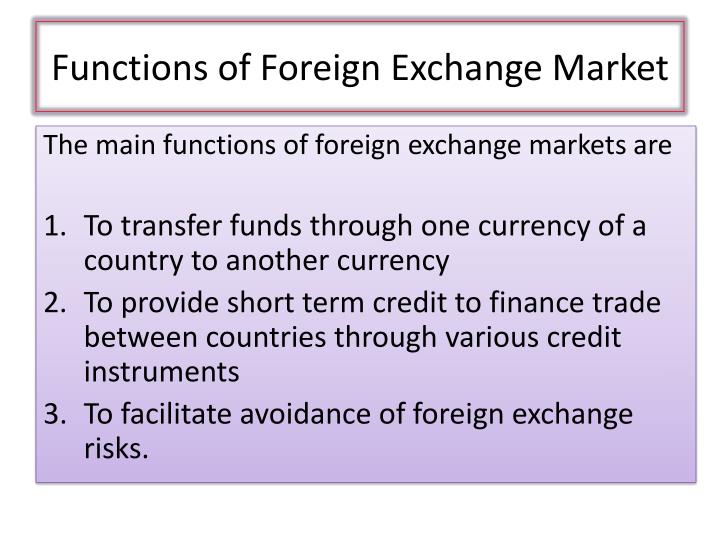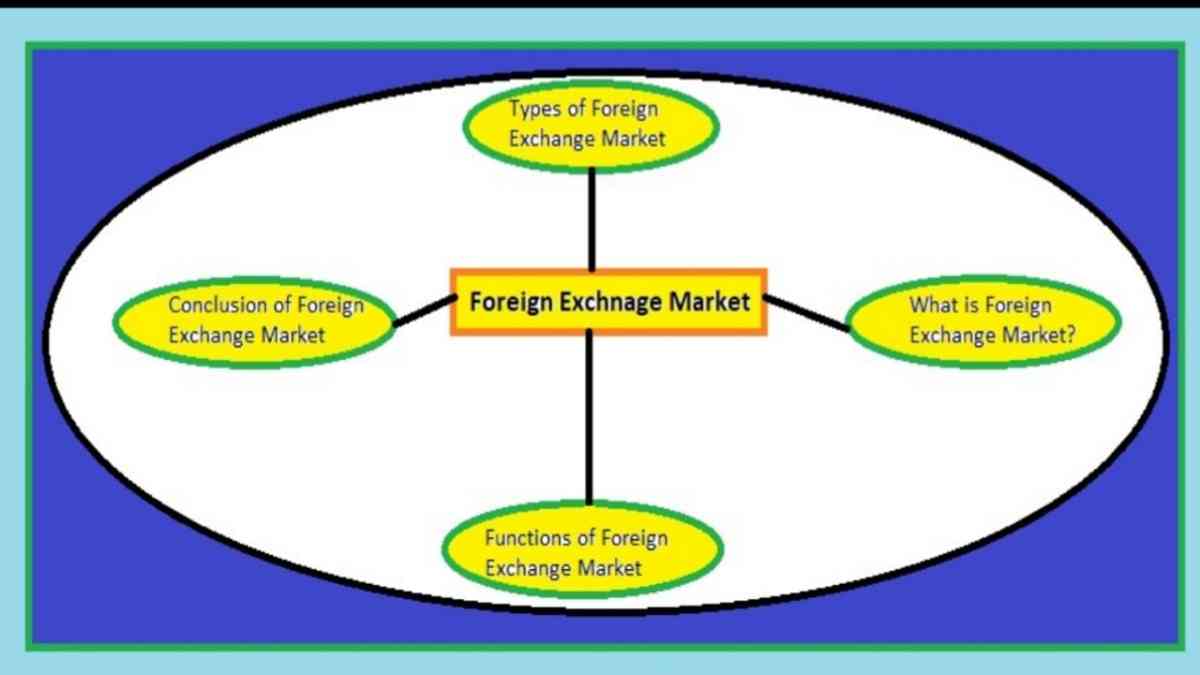Nature and functions of foreign exchange market - Delving into the nature and functions of the foreign exchange market, we embark on a journey through the intricate world of currency exchange, a cornerstone of global commerce and international finance.
The foreign exchange market, a vast and dynamic realm, serves as a pivotal platform for facilitating international trade and investment, currency conversion, and risk management.
Introduction: Nature And Functions Of Foreign Exchange Market

The foreign exchange market, also known as the forex market or currency market, is a global decentralized market where currencies are traded. It is the largest financial market in the world, with an estimated daily trading volume of over $5 trillion.
The foreign exchange market plays a vital role in the global economy by facilitating international trade and investment. It allows businesses to buy and sell goods and services from other countries, and it enables investors to diversify their portfolios by investing in foreign assets.
Obtain a comprehensive document about the application of foreign exchange market economics that is effective.
Role in International Trade
The foreign exchange market is essential for international trade. When a business imports goods or services from another country, it must exchange its domestic currency for the currency of the exporting country. This is done through the foreign exchange market.
For example, if a U.S. company imports goods from China, it must exchange U.S. dollars for Chinese yuan. The exchange rate between the U.S. dollar and the Chinese yuan will determine how many yuan the U.S. company receives for each dollar it exchanges.
Functions of the Foreign Exchange Market
The foreign exchange market is a global decentralized market for the trading of currencies. It facilitates the exchange of currencies for various purposes, including international trade, investment, and risk management.
Provide Liquidity for International Trade and Investment
The foreign exchange market provides liquidity for international trade and investment by ensuring that there is always a ready supply of currencies available for exchange. This liquidity allows businesses and investors to easily convert their currencies into the currencies they need to conduct international transactions.
- Example: A U.S. company that imports goods from China needs to convert U.S. dollars into Chinese yuan to pay for the goods. The foreign exchange market provides the liquidity necessary for the company to make this conversion.
Facilitate Currency Conversion
The foreign exchange market also facilitates currency conversion for individuals and businesses traveling abroad. It allows them to convert their home currency into the currency of the country they are visiting, making it easier for them to make purchases and pay for services.
Browse the multiple elements of foreign exchange market assignment pdf to gain a more broad understanding.
- Example: A tourist from the United Kingdom traveling to France needs to convert British pounds into euros to pay for expenses during their trip. The foreign exchange market provides the mechanism for the tourist to make this conversion.
Hedge Against Foreign Exchange Risk
The foreign exchange market also allows businesses and investors to hedge against foreign exchange risk. Foreign exchange risk refers to the risk that the value of a currency will fluctuate, which can affect the profitability of international transactions. Businesses and investors can use the foreign exchange market to lock in exchange rates and protect themselves against potential losses due to currency fluctuations.
- Example: A U.S. company that exports goods to Europe wants to protect itself against the risk that the euro will depreciate against the U.S. dollar. The company can use the foreign exchange market to enter into a forward contract to lock in the current exchange rate for a future transaction.
Participants in the Foreign Exchange Market

The foreign exchange market involves a diverse range of participants, each playing a specific role in facilitating global currency exchange and trade.
The major participants in the foreign exchange market include:
Commercial Banks
- Commercial banks are the primary dealers in the foreign exchange market, providing services to their customers for international trade, investment, and travel.
- They act as intermediaries between buyers and sellers of currencies, facilitating currency exchange and providing liquidity to the market.
Central Banks, Nature and functions of foreign exchange market
- Central banks are responsible for managing the monetary policy and foreign exchange reserves of their respective countries.
- They intervene in the foreign exchange market to influence the value of their currencies and maintain economic stability.
Hedge Funds
- Hedge funds are investment funds that use advanced strategies to speculate on currency movements.
- They play a significant role in providing liquidity to the market and influencing currency exchange rates.
Corporations
- Corporations engage in international trade and investment, requiring them to exchange currencies for business operations.
- They use the foreign exchange market to convert currencies for payments, investments, and hedging against currency risks.
Individual Investors
- Individual investors participate in the foreign exchange market for speculative purposes or to diversify their investment portfolios.
- They trade currencies through online platforms or brokers, seeking to profit from currency fluctuations.
Types of Foreign Exchange Transactions

Foreign exchange transactions can be categorized into three main types: spot transactions, forward transactions, and swap transactions. These transactions differ in terms of their settlement dates and the underlying objectives of the parties involved.
Spot Transactions
Spot transactions involve the immediate exchange of currencies at the prevailing market rate. The settlement of spot transactions typically occurs within two business days, making them suitable for immediate currency needs or short-term trading.
Forward Transactions
Forward transactions are agreements to exchange currencies at a predetermined rate on a future date. These transactions are typically used to hedge against currency fluctuations or to lock in a favorable exchange rate for future payments or receipts.
Swap Transactions
Swap transactions involve the simultaneous exchange of currencies with an agreement to reverse the transaction at a future date. These transactions are often used to manage currency exposure or to arbitrage interest rate differentials between different currencies.
Factors Affecting Foreign Exchange Rates
Foreign exchange rates are determined by a complex interplay of economic, political, and psychological factors. These factors can influence the supply and demand for currencies, leading to fluctuations in their values.
Some of the key factors that affect foreign exchange rates include:
Economic growth
The economic growth of a country can have a significant impact on its currency's value. A strong economy typically attracts foreign investment, which increases demand for the country's currency and leads to an appreciation in its value.
Enhance your insight with the methods and methods of foreign exchange market instruments.
Interest rates
Interest rates are another important factor that affects foreign exchange rates. Higher interest rates in a country make it more attractive for foreign investors to invest in that country, as they can earn a higher return on their investments. This increased demand for the country's currency leads to an appreciation in its value.
Inflation
Inflation is the rate at which prices for goods and services increase over time. High inflation can erode the value of a currency, as it reduces the purchasing power of individuals and businesses. This can lead to a depreciation in the value of the currency.
Political stability
Political stability is also an important factor that affects foreign exchange rates. A country with a stable political environment is more attractive to foreign investors, as they are less likely to lose their investments due to political unrest or instability. This increased demand for the country's currency leads to an appreciation in its value.
Regulation of the Foreign Exchange Market
Central banks play a pivotal role in regulating the foreign exchange market to maintain stability and prevent excessive volatility. They implement various measures to influence the exchange rates and ensure the smooth functioning of the market.Types of Foreign Exchange Regulations
Central banks employ different types of regulations to manage the foreign exchange market, including:- Capital Controls: Restricting the flow of capital into and out of a country, affecting the demand and supply of currencies.
- Foreign Exchange Intervention: Buying or selling currencies in the market to influence exchange rates.
- Reserve Requirements: Imposing requirements on banks to hold a certain amount of foreign currency reserves.
- Exchange Rate Pegging: Fixing the exchange rate of a currency to another currency or a basket of currencies.
Outcome Summary
In conclusion, the foreign exchange market stands as a linchpin of the global economy, enabling seamless cross-border transactions, currency conversions, and risk mitigation. Its multifaceted functions and diverse participants underscore its indispensable role in fostering international trade, investment, and economic growth.
